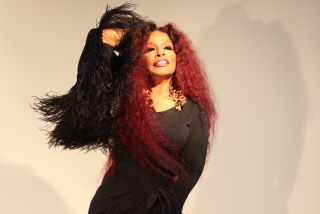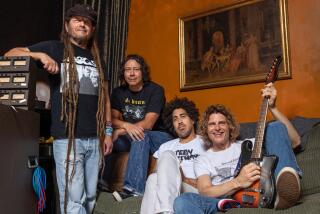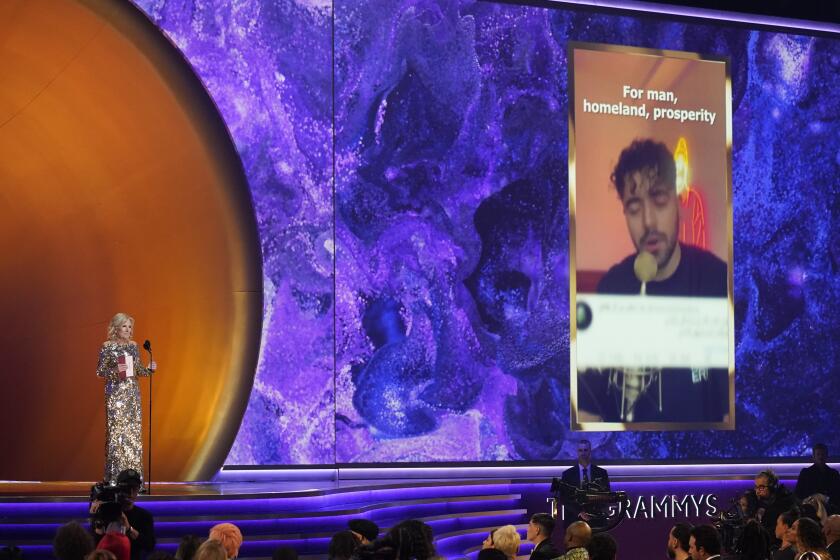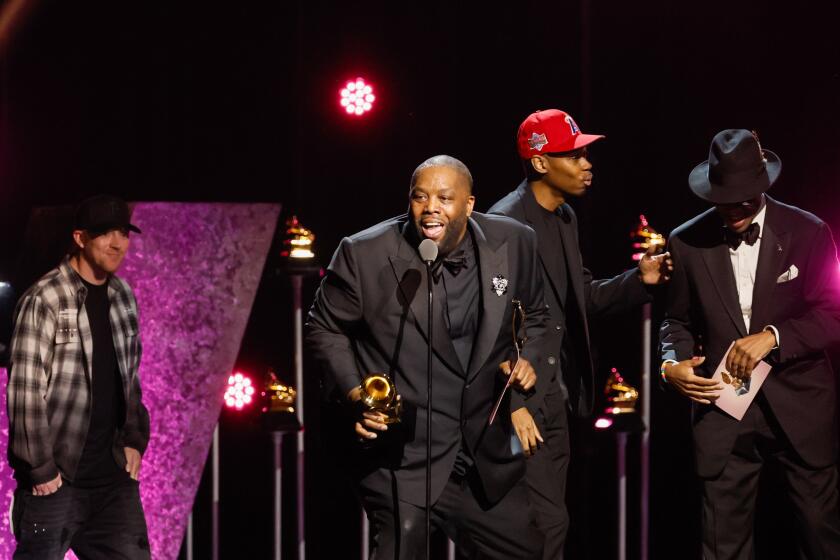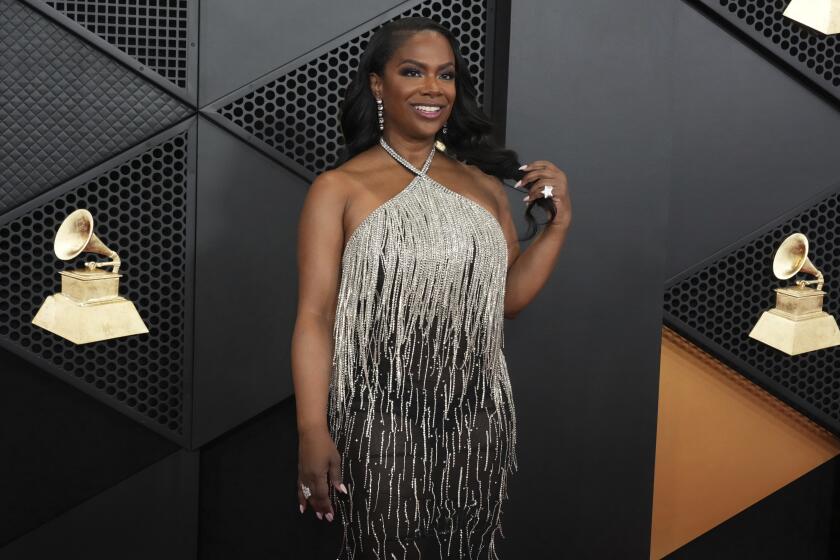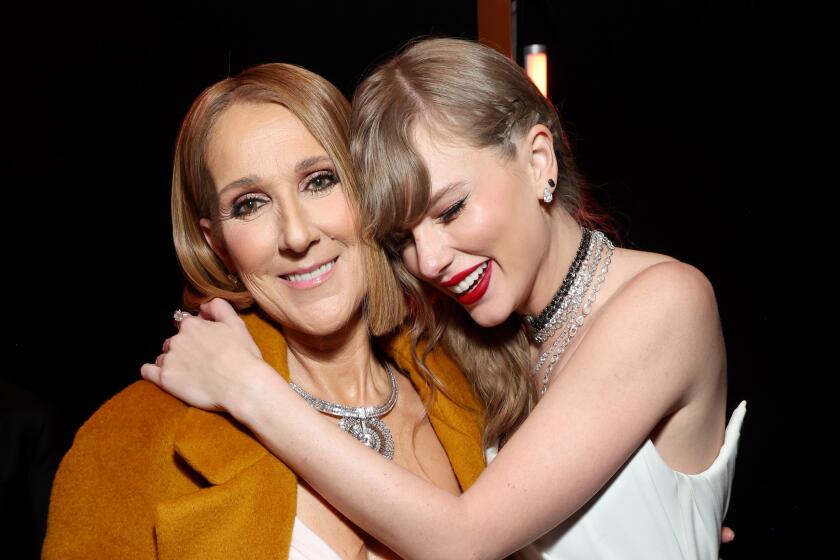TURNER’S COMEBACK TOPS GRAMMYS
Tina Turner climaxed one of the most dramatic comebacks in pop music history Tuesday night at the Shrine Auditorium when her recording of “What’s Love Got to Do With It” was named the best single of the year in the 27th annual Grammy Awards ceremony.
Turner, whose wild, hip-shaking stance with the Ike & Tina Turner Revue in the ‘60s and ‘70s helped define the concept of sex-and-soul in pop, was also honored for best female pop and rock vocals. Her attempt to become the first woman to win in three vocal categories in the same year was thwarted by Chaka Khan, who finished first in the R&B; field.
After breaking away from ex-husband Ike in 1974, Turner’s career all but disintegrated in this country until she rebounded in 1983 with a best-selling album, “Private Dancer,” and three hit singles, including “What’s Love Got to Do With It.” That selection, written by Graham Lyle and Terry Britten, was named the year’s best song Tuesday.
Turner, who received a standing ovation for her live rendition of “What’s Love Got to Do With It” told the audience after receiving her second Grammy: “I’ve been waiting so long for this. . . .”
Other key winners in the nationally televised ceremony included Lionel Richie, whose two awards included best album; Prince, whose “Purple Rain” won best sound track LP; the “Amadeus” sound track, best classical album, and trumpeter Wynton Marsalis, who repeated last year’s previously unprecedented feat of winning in both jazz and classical categories in the same year.
But the evening’s main winner was the National Academy of Recording Arts & Sciences, which sponsors the annual Grammy competition.
After years of being ridiculed by pop and rock critics for being too conservative in its choices, the academy came up this year with its most impressive set of nominees and with a ceremony that clearly elevated rock performers to equal status with more mainstream artists.
In fact, 1984 may go down as the year in which rock and roll was finally welcomed to the Grammy club--as such acclaimed rock figures as Prince, Bruce Springsteen and Cyndi Lauper were almost constant subjects of attention during the three-hour-plus program.
It was so satisfying to finally see Springsteen receive his first Grammy (for male rock vocal) that fans of the most acclaimed rock figure since Bob Dylan probably even forgave the recording academy for his loss three years ago to soap opera heartthrob Rick Springfield.
Similarly, Prince’s three awards--he also won for best rock group vocal and R & B song--were probably enough to cause fans of the Minneapolis-based performer to overlook all the years that Prince failed to win Grammys for such noteworthy albums as “Controversy” and “1999.”
Other rock-affiliated artists who scored victories included Lauper (best new artist), Phil Collins (male pop vocal), Yes (rock instrumental) and David Bowie (best video).
But it would be narrow-minded to suggest that recognition of rock artistry was the one standard by which to measure the relevance of this year’s Grammy presentation. Distinguished veteran artists in various other fields also picked up overdue Grammys. They included Merle Haggard (male country vocal), Randy Newman (pop instrumental composition) and Joe Williams (jazz vocal solo). In the past, Grammy balloting has been a struggle between progressive and conservative factions with the conservatives almost always winning.
Perhaps the moment that most symbolized the musical unity of the evening was when composer-conductor Leonard Bernstein was saluted with a Lifetime Achievement award. After receiving a standing ovation, Bernstein stressed the importance of recognizing quality in all areas of music, including the Beatles and other pop stars. With a big smile he then introduced Tina Turner, who performed her Grammy-winning song.
Aside from Turner, the most dramatic moments Tuesday involved Prince. It was only four years ago that the pop-rock maverick was booed off the stage when he opened for the Rolling Stones in a concert at the Los Angeles Memorial Coliseum, just a few blocks from the Shrine.
Though rock’s roots are in black music, rock radio programmers resisted playing black music in the ‘70s, leaving most young fans to assume that anyone black must be part of what was considered the dreaded disco movement. So, fans near the front of the Coliseum stage hurled paper cups and shouted insults at Prince, who was largely unknown to rock fans then.
But the diminutive singer-guitarist began attracting a rock following with his early 1983 hit “Little Red Corvette,” and he broke through to superstar status last year with “Purple Rain,” the biggest-grossing rock film ever. Prince’s passionate music and sexual renegade image were also probably troubling four years ago to many of the 6,000 Grammy voters. They too, however, were captivated by the music in “Purple Rain,” granting Prince five nominations in this year’s competition--and inviting him to perform on the Grammy telecast.
After all the build-up, Prince’s performance, an extended version of “Baby, I’m a Star,” was something of a letdown, reflecting only a fraction of the singer’s normal concert charisma. But his theatrical instincts redeemed him somewhat as he left the stage by racing down the middle aisle of the Shrine out to his purple limo while the band continued to play. If he had won best album later in the show, he wouldn’t have been there to accept it.
Producer-arranger Quincy Jones moved into fourth place on the all-time Grammy list by winning his 16th award, this one for best arrangement on an instrumental. Composer-conductor John Williams moved into a tie with Stevie Wonder for fifth place on the all-time list when he won his 15th Grammy. The award was for best instrumental composition.
Additional multiple winners included the Pointer Sisters, Shirley Caesar, producer-arranger David Foster and arranger Jeremy Lubbock.
In posthumous awards, Count Basie was awarded a ninth Grammy for best Big-Band instrumental performance, and Steve Goodman’s “City of New Orleans” was named the year’s best country song.
Michael Jackson, who won a record eight Grammys last year, was honored this time for best video album for “Making Michael Jackson’s ‘Thriller’.”
More to Read
The biggest entertainment stories
Get our big stories about Hollywood, film, television, music, arts, culture and more right in your inbox as soon as they publish.
You may occasionally receive promotional content from the Los Angeles Times.
